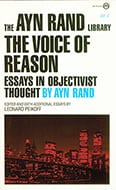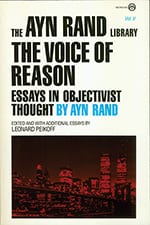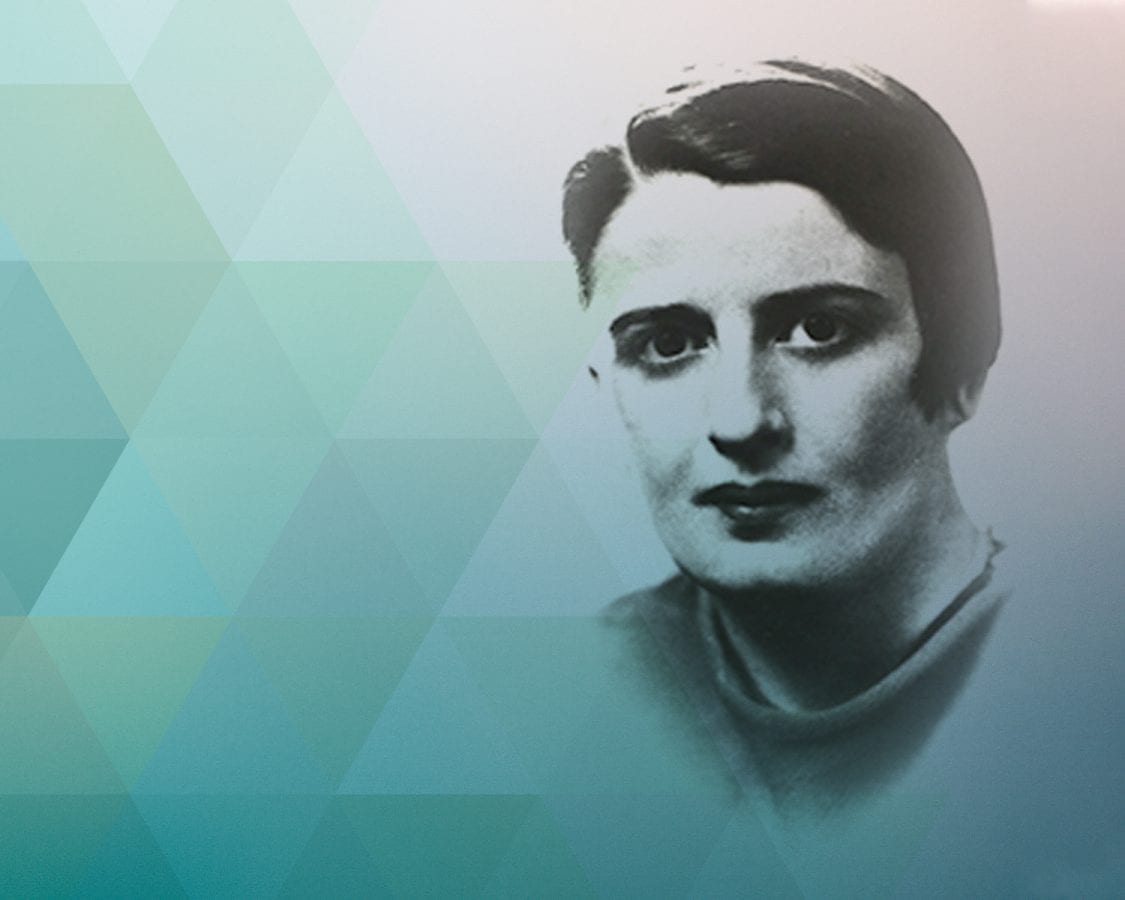In 1962, the Los Angeles Times invited Ayn Rand to write a syndicated column on her philosophy’s application to current events. Her first weekly column, published June 17, 1962, introduces readers to Objectivism’s positions on the nature of reality, the efficacy of human reason, the nature of man, and the ideal political system. Rand also examines the moral principle of altruism and the threat it poses to America’s founding principles. The essay was later anthologized in The Voice of Reason: Essays in Objectivist Thought (1989) and The Ayn Rand Column (1991 and 1998).
On October 2, 1962, The Ayn Rand Program debuted on Columbia University’s campus radio station, WKCR, in New York City. In this recording of the first program in that series, Rand reads her inaugural Los Angeles Times column and then expands on its key points. Noting the impossibility of validating a philosophy’s key positions in a brief oral presentation, Rand urges interested listeners to consult her written works, particularly Atlas Shrugged. She discusses widespread misrepresentations of her views and challenges her opponents to refute her actual positions rather than attack a “straw woman.” She goes on to discuss the relation between reason and emotion, the true nature of altruism, the harmony of rational men’s interests, the proper role of government and the evil of initiating physical force against others.
The radio program lasts 28 minutes.
Rand’s radio recitation of her inaugural column is also the core of an ARI Campus lesson, “Introducing Objectivism,” which offers visual supplements in the form of outlines, diagrams, historical photographs and manuscript pages. A link to it appears in “Related Lessons” below.
At a sales conference at Random House, preceding the publication of Atlas Shrugged, one of the book salesmen asked me whether I could present the essence of my philosophy while standing on one foot. I did, as follows:
1. Metaphysics: Objective Reality
2. Epistemology: Reason
3. Ethics: Self-interest
4. Politics: Capitalism
If you want this translated into simple language, it would read: 1. “Nature, to be commanded, must be obeyed” or “Wishing won’t make it so.” 2. “You can’t eat your cake and have it, too.” 3. “Man is an end in himself.” 4. “Give me liberty or give me death.”
If you held these concepts with total consistency, as the base of your convictions, you would have a full philosophy to guide the course of your life. But to hold them with total consistency — to understand, to define, to prove, and to apply them — requires volumes of thought. Which is why philosophy cannot be discussed while standing on one foot — nor while standing on two feet on both sides of every fence. This last is the predominant philosophical position today, particularly in the field of politics.
In the space of a column, I can give only the briefest summary of my position, as a frame of reference for all my future columns. My philosophy, Objectivism, holds that:
1. Reality exists as an objective absolute — facts are facts, independent of man’s feelings, wishes, hopes, or fears.
2. Reason (the faculty which identifies and integrates the material provided by man’s senses) is man’s only means of perceiving reality, his only source of knowledge, his only guide to action, and his basic means of survival.
3. Man — every man — is an end in himself, not the means to the ends of others. He must exist for his own sake, neither sacrificing himself to others nor sacrificing others to himself. The pursuit of his own rational self-interest and of his own happiness is the highest moral purpose of his life.
4. The ideal political-economic system is laissez-faire capitalism. It is a system where men deal with one another, not as victims and executioners, nor as masters and slaves, but as traders, by free, voluntary exchange to mutual benefit. It is a system where no man may obtain any values from others by resorting to physical force, and no man may initiate the use of physical force against others. The government acts only as a policeman that protects man’s rights; it uses physical force only in retaliation and only against those who initiate its use, such as criminals or foreign invaders. In a system of full capitalism, there should be (but, historically, has not yet been) a complete separation of state and economics, in the same way and for the same reasons as the separation of state and church.
Capitalism was the system originated in the United States. Its success, its progress, its achievements are unprecedented in human history. America’s political philosophy was based on man’s right to his own life, to his own liberty, to the pursuit of his own happiness, which means: on man’s right to exist for his own sake. That was America’s implicit moral code, but it had not been formulated explicitly. This was the flaw in her intellectual armor, which is now destroying her. America and capitalism are perishing for lack of a moral base.
The destroyer is the morality of altruism.
Altruism holds that man has no right to exist for his own sake, that service to others is the only moral justification of his existence, and that self-sacrifice is his highest moral duty. The political expression of altruism is collectivism or statism, which holds that man’s life and work belong to the state — to society, to the group, the gang, the race, the nation — and that the state may dispose of him in any way it pleases for the sake of whatever it deems to be its own tribal, collective good.
“From her start, America was torn by the clash of her political system with the altruist morality. Capitalism and altruism are incompatible; they cannot coexist in the same man or in the same society. Today, the conflict has reached its ultimate climax; the choice is clear-cut: either a new morality of rational self-interest, with its consequences of freedom, justice, progress and man’s happiness on earth — or the primordial morality of altruism, with its consequences of slavery, brute force, stagnant terror, and sacrificial furnaces.” [For the New Intellectual]
You may observe the practical results of altruism and statism all around us in today’s world — such as the slave-labor camps of Soviet Russia, where twenty-one million political prisoners work on the construction of government projects and die of planned malnutrition, human life being cheaper than food — or the gas chambers and mass slaughter of Nazi Germany — or the terror and starvation of Red China — or the hysteria of Cuba where the government offers men for sale — or the wall of East Berlin, where human beings leap from roofs or crawl through sewers in order to escape, while guards shoot at fleeing children.
Observe these atrocities, then ask yourself whether any of it would be possible if men had not accepted the idea that man is a sacrificial animal to be immolated for the sake of the “public good.” Read the speeches of those countries’ political leaders and ask yourself what arguments would be left to them if the word “sacrifice” were regarded not as a moral ideal, but as the anti-human evil which it is.
And then, listen to the speeches of our present [Kennedy] Administration — and ask yourself the same question.







